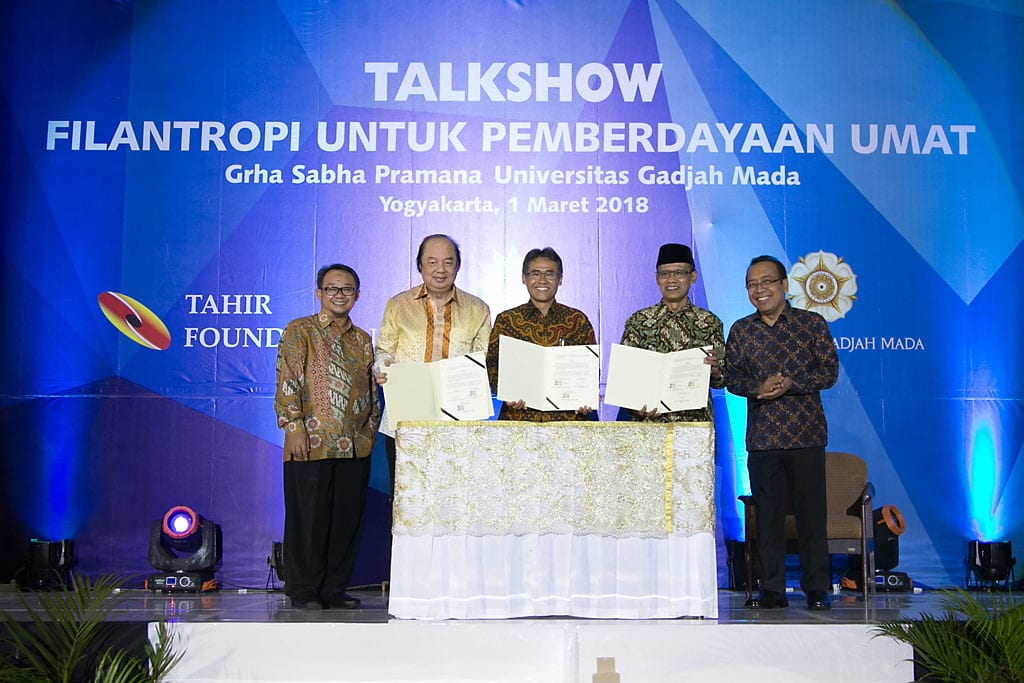Yogyakarta, UGM – Tahir Foundation (TF) in collaboration with Universitas Gadjah Mada (UGM) and Universitas Muhammadiyah is currently developing a philanthropic program for community empowerment. The program will be funded by the TF in the amount of IDR 50 billion per year or around IDR 250 billion over a five-year period in the fields of health, education, and job creation.
Tripartite cooperation – TF, UGM, and Muhammadiyah – is established on the principle of philanthropy to do humanitarian actions for the common good in terms of fulfilling basic human and environmental needs. In the midst of the strengthening of current primordial identity of religion, ethnicity and nationality, philanthropy has become a ‘language’ that can be accepted by various parties due to its character goes beyond the identity. Besides, philanthropy is no longer a mere donation movement, but has also developed into sustainable community empowerment programs.
TF as a philanthropic institution has track records both at national and international levels. It is the only institution in Asia that receives UNHCR Eminent Advocate, an award for significant and positive funding contributions for handling the refugee problems. The award helped make it the largest philanthropic institution in Asia. Funds of USD 14 million have been donated to help the UN Refugee Commission in dealing with Syrian refugees. TF also donates it to the Global Fund and is involved in humanitarian action against Rohingya refugee children. TF directly deals with various humanitarian problems in the aftermath of disasters in several regions of Indonesia by using philanthropic funds.
In addition to the presence of TF, Muhammadiyah is the largest modern Islamic organization of Indonesia which has also performed philanthropic programs in many regions of Indonesia. In East Nusa Tenggara and Papua, for example, the communities that receive the benefits from the education and health programs developed by Muhammadiyah are Christian communities. Muhammadiyah is also directly involved in handling the humanitarian problems of Rohingya refugees. Its philanthropic activities also go beyond religion, ethnicity, and nation identity.
The next institution is UGM, which has long experiences and extensive networks in developing science and technology for community empowerment. The students of UGM conduct an internship called Kuliah Kerja Nyata Pemelajaran Pemberdayaan Masyarakat (KKN-PPM) program to various regions of Indonesia. It aims to increase the empathy and care of UGM academics for diverse real problems in society. In addition, it is also one form of UGM participation to support the government program in improving the welfare of community.
Known as a populist university, UGM has superior potentials in human resources and sciences, so that it can give community services through the down-streaming of research findings or activities.
According to UGM perspectives, the tripartite cooperation is very crucial and strategic to binding back the nationality of Indonesia, at least in four ways. First, the presence of TF in philanthropy program that directly targets lower-class communities can increase the sense of nationality to establish the unity of Unitary Republic of Indonesia or called Negara Kesatuan Republik Indonesia (NKRI). Second, the philanthropic program that directly targets lower-class communities also aims to reduce inequalities between social classes in order to strengthen social integration. Third, philanthropic program can increase the relationship of mutual trust among diverse social elements, interfaith groups, ethnicities, races and classes. Fourth, it develops a model of community empowerment according to the Tri Dharma of Higher Education based on applicable and sustainable research findings.
The tripartite collaboration is based on the principles of autonomy and independence of the parties. Each party (TF, Muhammadiyah, or UGM) is autonomous institution, have independence in action and independent interests. This collaboration is based on the principle of mutual trust, that is, each has a commitment to realize the common good as a nation and humanity in accordance with the capacity, mission, and character of each party.
The tripartite collaboration is marked by the signing of MoU which had been held on Thursday, March 1, 2018, at 11-11.30 a.m. at Grha Sabha Pramana, UGM. Previously, the signing of the MoU began with a talk show “Philanthropy for Community Empowerment” at 09-11 a.m. moderated by Najwa Shihab and delivered by the speakers such as Dr. H. Haedar Nashir, M.Sc (Chairperson of PP Muhammadiyah), Prof. Dr. Dato ’Sri Tahir, MBA (Founder and Chairperson of Tahir Foundation), Prof. Ir. Panut Mulyono, M. Eng., D. Eng (Rector of UGM), and Prof. Dr. Praktikno, M.Soc.Sc. (Minister of State Secretary/Chairperson of UGM Board of Trustees). []

